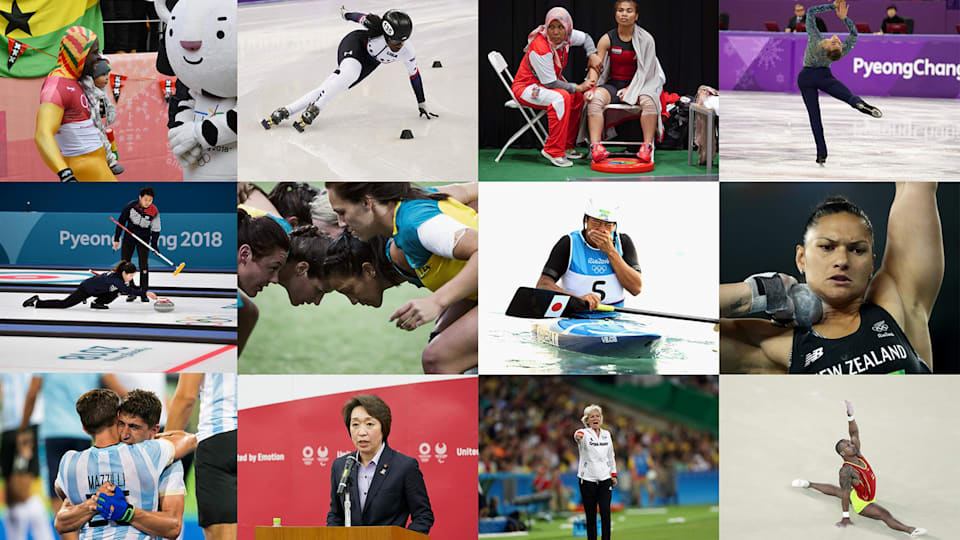IOC publishes updated Portrayal Guidelines to help ensure gender-equal, fair and inclusive media coverage of Paris 2024
The International Olympic Committee (IOC) has announced the publication of its updated Portrayal Guidelines, a key part of its efforts to promote inclusivity and equality in the media’s portrayal of athletes at the Olympic Games Paris 2024.

With Paris 2024 set to be the first Olympic Games to achieve full gender parity on the field of play, the updated Portrayal Guidelines seek to raise awareness about the differences in how sportswomen and women’s sport are portrayed in comparison to their male counterparts. The guidelines provide practical checklists and advice to help ensure gender-equal and fair representation of all athletes across all forms of media and communication.
The two weeks of Olympic coverage are a unique opportunity to generate new strong, positive and diverse role models, and to promote balanced coverage and fair portrayal of sportspeople in all their diversity – irrespective of gender, race, religion, sexual orientation or socio-economic status.
The portrayal guidelines are available in multiple languages:
- IOC Portrayal Guidelines for Gender-equal, fair and inclusive representation in sport
- Directives du CIO pour une représentation égalitaire, équitable et inclusive des genres dans le sport
- Directrices del COI para una representación igualitaria, justa e inclusiva en el deporte
- スポーツにおけるジェンダー平等、公平でインクルーシブな描写のための表象ガイドライン
- 展现方式指南:体育运动中的性别平等、公平及包容性表述
- Diretrizes de Representação retrato igualitário, justo e inclusivo no esporte
Key updates for 2024
Building on previous versions of the guidelines, which were first published in 2018 and updated in 2021, the latest edition is designed to foster more inclusive and respectful sports coverage, and includes updated examples and references that reflect the latest in gender-equal portrayal practices. An annex that provides definitions, language practices, and considerations for respectful and inclusive coverage of transgender and non-binary participants, plus athletes with sex variations, is also included. This annex follows the release of the IOC Framework on Fairness, Inclusion and Non-Discrimination on the Basis of Gender Identity and Sex Variations in November 2021.
Emphasising the need for gender-equal and fair representation
Historically, sports coverage has often highlighted non-sports-related characteristics of sportswomen, such as their physical appearance and personal lives, rather than their athletic achievements. The IOC's Portrayal Guidelines are aimed at addressing these disparities by ensuring that women's sport receives equal visibility, and female athletes are celebrated for their competitive accomplishments.
The updated guidelines therefore seek to support media outlets and content creators in implementing balanced reporting and communication across various platforms, including print, digital, radio and broadcast. By calling for more inclusive and representative media practices, the IOC hopes to shift public perception and promote new, diverse role models within sport.
Balanced storytelling for all athletes
The Portrayal Guidelines were drafted in 2018 following the work of the IOC Gender Equality Review Project, which carried out a comprehensive review of the current state of gender equality in the Olympic Movement and issued 25 bold and action-oriented recommendations to advance gender equality. One of them was to establish principles and guidelines for fair and balanced portrayal in all its forms of communication.
As the permanent host broadcaster for the Olympic Games, producing the live television, radio and digital coverage of the event, Olympic Broadcasting Services (OBS) contributed to the guidelines by sharing its broadcast expertise.
“As we prepare for the Olympic Games Paris 2024, the updated Portrayal Guidelines are pivotal in our mission to deliver fair and inclusive coverage of all athletes,” explains Yiannis Exarchos, CEO of OBS.
At Olympic Broadcasting Services, we are committed to using our platform to showcase the diverse stories and achievements of sportspeople worldwide, ensuring that our broadcasts reflect the true spirit of equality and excellence that defines the Olympic Movement.
In addition to its commitment to fair and balanced storytelling for all athletes, OBS is aiming to close the gender gap in key broadcast roles. This commitment involves empowering women in production, editorial and technical positions, to foster a more inclusive broadcast environment in sport.
For Paris 2024, this includes hiring approximately 35 female commentators and ensuring balanced gender representation among senior staff and venue production teams. OBS is also aiming to achieve gender parity in the coverage of both live and non-live content on Olympics.com, with a focus on amplifying women's voices and stories.